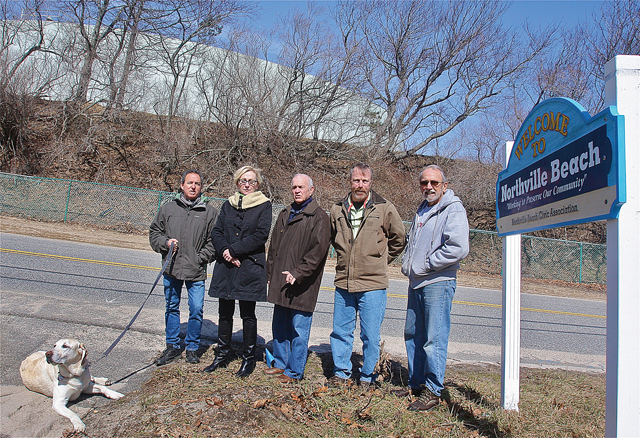Planned terminal expansion has neighbors on edge in Northville

Safety. Traffic. The environment.
Residents of the Northville area of Riverhead and beyond have been concerned about all three ever since United Riverhead Terminal Inc. first appeared before the Riverhead Town Board in September with plans to expand its sprawling petroleum storage facility alongside Long Island Sound.
Over the last few months, some have harkened back more than 50 years, to the time when people then living in neighboring Northville Beach fought but failed to stop construction of the massive string of tanks that punctuates the otherwise wooded and rural landscape.
“Not only could the locals not stop the terminal then, the Town Board couldn’t either,” said part-time Northville Beach resident Kathleen McGraw, whose family joined the fight against the tank field in the 1950s. “They unanimously objected to the facility, saying it ‘would create many unpleasant conditions in the entire area.’ The terminal was allowed by the State Board of Land Commissioners.
“That terminal haunts me because had the town had the zoning it has today back in 1955 it wouldn’t be there,” she continued. “Well, now the town has zoning and today’s Town Board can and should stop this expansion.”
For their part, URT representatives point out that gasoline had been stored at the site before, as recently as the 2000s, and they already have the go-ahead from the state Department of Environmental Conservation to convert two of the 20 storage tanks that now store home heating oil on the 286-acre Sound Shore Road property to gas. The company also plans to build two new tanks for ethanol, for which they say they also have DEC approvals. On-site ethanol is needed so it can be blended with gasoline as the fuel is readied for market.
In order to build the ethanol tanks, however, URT also needs a special permit from the Riverhead Town Board. If public opinion were to dictate how Town Board members would vote on that permit, the application would likely be rejected. The file in the town clerk’s office contains more than 20 letters opposing the proposed change, most of them from residents who live near the facility or from civic and environmental organizations. There is also a public hearing scheduled for tonight, Wednesday, which will technically be a continuation of a public hearing that ran long in October.
Check back at riverheadnewsreview.com for live coverage of the hearing.
“The town doesn’t regulate gasoline storage,” Supervisor Sean Walter said this week. “They already have a permit from DEC for that.”
The tank farm was built in 1955 by Northville Industries, which operated it until 1992, when it was sold to Tosco Corporation. Tosco owned it until 2001 and, ever since, it had been owned by Phillips Petroleum, ConocoPhillips and Phillips 66 — all spinoffs or consolidations of the same company.
United Riverhead Terminal, headed by billionaire John Catsimatidis, purchased the property in 2012.
Mr. Catsimatidis is the CEO of the Gristedes supermarket chain and the Red Apple Group real estate firm. He also recently purchased Metro Fuels, which has facilities in Brooklyn and at the Enterprise Park at Calverton. Metro Fuels supplies and delivers various types of fuel, from biodiesel to natural gas and gasoline.
At an Oct. 21 public hearing on the Northville proposal in Town Hall, United Riverhead Terminal general manager Scott Kamm said the proposed change would result in 12 additional trucks per day on local roads, but that in the summer, when heating oil in less in demand, there may be fewer.
The last time gasoline was stored at the tank farm was 2000, Mr. Kamm said, when it was owned by Tosco.
“Over the years the terminal has maintained a great safety record storing and distributing gasoline at the facility by its previous owners,” he said last year. “Although we haven’t stored or distributed gasoline for several years, we were prompted to do so by government officials and emergency services following the aftermath of Hurricane Sandy in 2012, which caused a gasoline disruption on Long Island.
“The gasoline project will create jobs, support our local contractors and secure the East End of Long Island from another gasoline disruption,” Mr. Kamm said.








